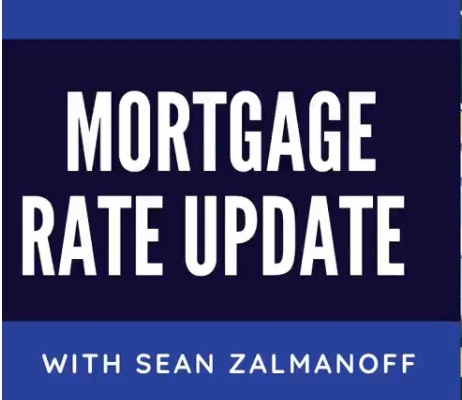Hello, hello, everyone. Sean Zalmanoff here with this week’s mortgage rate update. Man, another crazy week in the markets. I can’t wait to come on here one Monday and tell you that things are just kind of the same as last week and that rates are moving back down again, but that might not be in the too-distant future.
Stimulus deal, $1.9 trillion, passed the Senate. It originally passed the House under some different language, went to the Senate. They have approved that, and now it’s back to the House for the final vote. All but a foregone conclusion as it seems it’s going directly along party lines, and there’s more Democrats in the House than Republicans. So barring anything really crazy, this bill is done.
Is this going to cause inflation, is this not going to cause inflation? Well, it’s hard pressed to imagine $1.9 trillion hitting our economy, that’s on top of the $4 trillion that’s been done in previous stimulus bills, and it not causing some sort of inflation. Now the big question is… There’s several of them, actually. Is it priced in already? Again, remember I tell you this every week. Inflation is the archenemy of bonds. If we inflate the economy, although it’s going to be good for some sectors and more people potentially are in the housing market because more people have jobs, that’s going to make interest rates go up. For that reason, we are definitely against inflation. We are all for a good, healthy 2%-ish inflation a year. That seems to be really healthy for the economic engine to continue to run.
The question is, is this price in the interest rates already? The Fed has said, Jerome Powell has said that he’s good with it running hotter for a little while. And what happens in fall and winter? Are we through all this stuff with the big part of COVID? Are we going to have many people vaccinated by then? Are the new variants going to be workable, or a booster shot with the vaccine? Are we going to get enough people to take the vaccine? There are so many questions that play into all of this, for what the end answers end up being in our world.
What does this mean for you? I like to follow… I like to follow a lot of economists. David Tepper is one of the economists I like to follow, and his opinion is that the rise that we’ve seen in bond yields is close to over for the time being. Now, it depends on how hot things continue to run. Last Friday, there was around 150,000 jobs expected to be created, and there were over 350,000 jobs created. Great for the economy, want to get people back to work, but those are the kinds of things that can cause inflation, more demand for goods, higher prices for goods.
This Wednesday, we have the consumer price index, the CPI. Now there’s two big numbers reported every month. There’s the CPI, consumer price index, and the PPI, the producer price index. The consumer price index is the month-over-month increase of what consumers pay on goods. The producer price index is what producers of goods, manufacturers, pay for goods and supplies. Sometimes these things are passed on to the consumer. Eventually they always are. Sometimes they’re just minor blips along the way, and they’re not passed on up or down.
You have the monthly readings that come out, and then there’s an annual gauge that they try to target around 2% for core inflation. Man, there’s a lot of economics today, guys. Core inflation is when you strip out food and energy, because food and energy are the most volatile. Obviously, we’re in the time of year where it’s cold outside. It’s about to get a lot warmer, but it’s still chilly, we’re still running our furnaces, and so gas and things go up during this time of year. Summer electric goes up more. It’s funny how that works when you have more demand in these things for us.
There’s a lot ahead of us right now, but last Friday… Let’s go back to that jobs number because the stock market ended up, I think like 600 points on Friday, 570 points. Don’t hold me to that, but I’m pretty close. At one point, the markets were down almost that much. There was literally a 1000-point swing in the markets. Although that kind of volatility is not generally healthy, we had a huge sell-off to start the morning. Bonds were acting crazy on us, not in a good way, to start the morning. And so that sell, when stocks rebounded, mortgage-backed securities, bonds, treasuries, they didn’t sell off. Yields didn’t rise a ton. That was really good and promising.
As the stimulus bill got passed, the futures market was almost flat, but when it opened this morning, the stocks really popped for us. Bonds are again continuing to trend pretty flat. If we get rises in the stock market, signs of potential inflation without big jumps in yields, then a lot of this is priced in, and that will be good for some stability across our threshold.
Hey, if you got questions, if you got comments, leave them below. We’ll answer them for ya. Hit us up on the DM. We are here to help you. We appreciate you. Have an awesome week, y’all. Again, I’m Sean Zalmanoff, the Sean Z Team. There’s probably a number somewhere on here if you want to call us for any insights, questions, feedback, or just to say hello. Peace, y’all.

